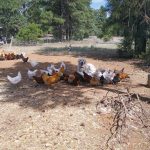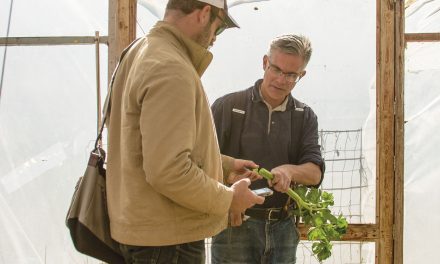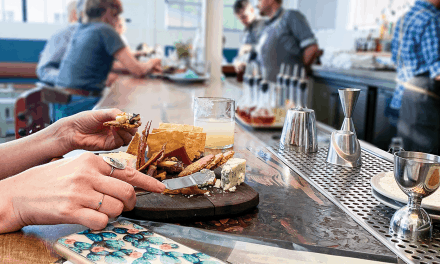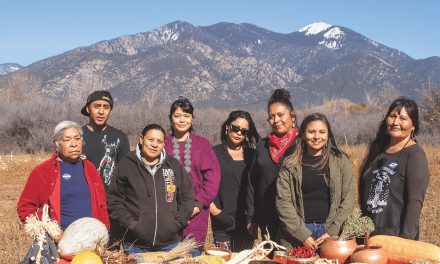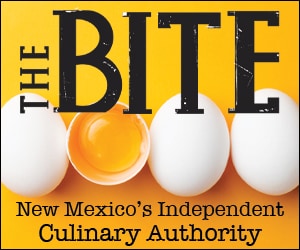
Jesus Guzman farms on about three acres split between four parcels in Nambé—one at his home and three that he leases. In addition to farming, he’s been a landscaper, a property caretaker, and a dairy worker. Among other things, he grows blue and red corn, chicos, beans, onions, peas, garlic, and, lately, drought-tolerant asparagus.
WHY FARM?
My father started me when I was seven where I grew up down in Mexico. I’m the second kid in the family. It was me, my older sister, my dad, and my mom at that time. And you don’t work there eight hours a day. You get up at five o’clock in the morning, and if you don’t get up, somebody will get you up and take you there. And they feed you and everything, but they work you until—they give you a little time for lunch—and then when the sun goes down and you can’t see the [woods] anymore, then it’s time to go home.
When I came over here, I was a twenty-two-year-old guy. I started doing this because I like it. And I had a job, and I started doing this on the side.
I think it’s a comfortable life.
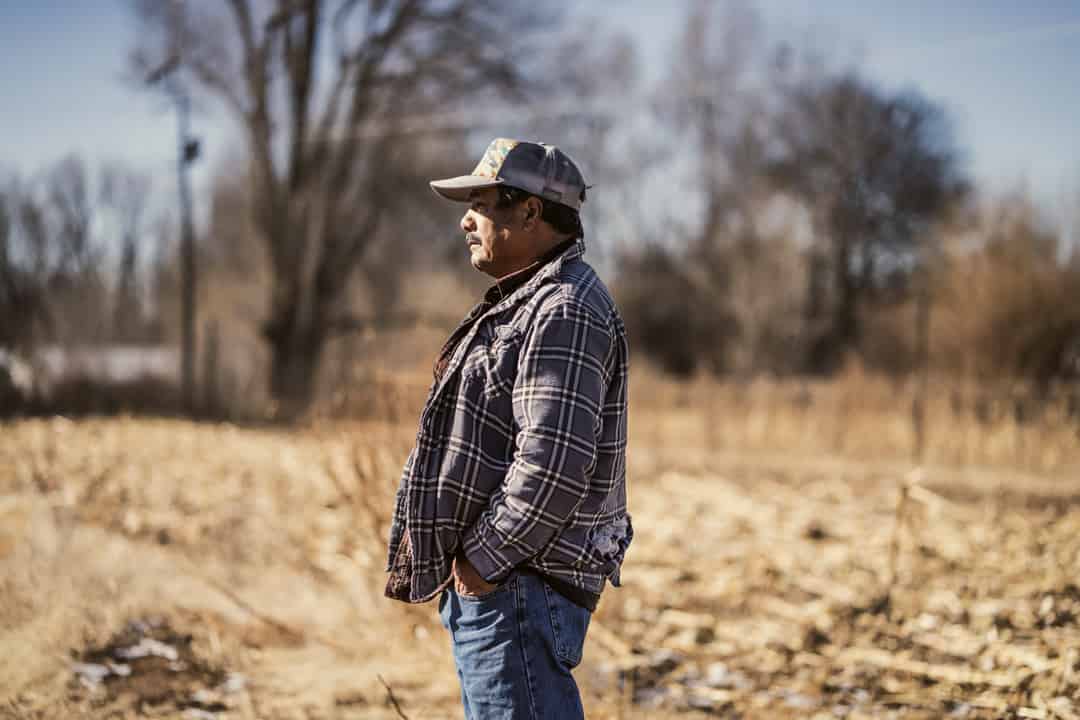
DREAMS
So then, like everybody, the dream was, I’m gonna work hard and own my own house one day. I did work hard. I never worked eight hours a day. I used to work at the dairy, start at three o’clock in the morning, to eight, go to breakfast, start at nine back in the fields, to three o’clock, start back in the dairy three o’clock in the afternoon to eight or nine at night.
ACCIDENTS
When I was in Medanales, I had a property that was 2.2 acres. I had eleven cows. I had like ten goats and eight or nine sheep. I had twenty pigs. I had a couple of dogs. I had like eighty chickens. In the summer, I had to make sure I had enough hay for my cattle and enough feed for my animals. I had a big barn built and I put everything underneath it in the summer for the winter.
Then, in 1999, I fell off a tree and I broke my back in two parts. So I got rid of the cows, I got rid of the goats, and sheep, and pigs, and I just left the chickens. I wasn’t able to go and load up my flat trailer with 120 bales of hay by myself into the field. So after that I couldn’t do it anymore.
My second accident was in 2010, I fell off a ladder and broke my right shoulder.
The last one was in 2013; since then I’ve been less of a farmer or anything else.

CLIMATE
I’m originally from a town that is called Yuriria, Guanajuato. Here, we grow with flooding. There, we used to farm with the rain, just dryland. But it rained enough to where you can harvest anything.
Here, we’ve got a shortage of water since 1996. We didn’t irrigate not even one time that year. From there, there have been bad years, somewhat good years, but never like before that. Between 1980 and 1995, we had water to throw away. The ditches were running from the first of April to the first of October. Last year, it was okay, but we’ve never had what we had in those days. I don’t know where we’re going with this as far as farming here. Now I’ve got that pond dug out for the same reason. To store water. That helps me with my seedlings when I transplant. Nowadays we get four days of water in the ditch every so often. Maybe three or four times in the whole summer. I’m trying to switch to things that grow with less water.
The sun is more intense than before. The last two to three years, I’ve been noticing that some of the plants get curled, the leaves get burned.
If this continues, it’s gonna end. There’s no way that you are going to be able to farm outside in this heat and no water. I hope that it will change.
CHANGE
Nothing is like it used to be. In those days, I worked on the main ditch. Every spring, every Saturday, it would be thirty or forty would line up, and we would dig up that ditch. Right now the ditches we’re digging up, they’re two feet higher than it’s supposed to be. But there’s no people to dig them out. So all of that soil there is soft, so when the water comes, most of it goes down. By the time we know it, there’s not going to be any ditches unless they get a machine to go and dig it out.
The old farmers, who’s gonna be the next generation if nobody wants to do it?

VALUE
Especially here, we all got little gardens. We don’t got big gardens like other places. And we’re barely making it. Because you put a lot into it to get very little off of it. If you’re gonna add every minute that you work on it, let’s say fifteen bucks an hour, and then your seeds, and then your time to go running up to the water in the middle of the night, and do all of these things, I think that people who eat my stuff should be proud of it. And say, “This guy really worked for it.”
THE FARMERS MARKET
I think we’re lucky to have customers to support us. Because we have high prices. I don’t believe that a pound of beans is worth five bucks. And I don’t believe that a pound of asparagus is worth eight dollars. I don’t believe a pound of chile will be worth thirty or forty dollars. I sell my chile powder at twenty dollars a pound, which I think is a little stiff, to tell you the truth.
I base every price on what I believe that I would be able to pay for it. I figure that the people that come to the farmers market and support us and buy our stuff, I think that they work for their money. I think most people work for what they have.
COMMUNITY
You know, a lot of people here don’t like us Mexicans. They’ve said it to myself, “People from Mexico don’t deserve to own land here.” And I said, “Anybody that can buy it with their own money, they deserve it.” They’re very proud to say, “Well, I’m an American, and I don’t own one inch of land over here.” Well, why is that my fault? How do they see it that way?
When I came over here and I started working and I started meeting people, the one thing, when I knew I wanted to be here for the rest of my life, I contribute to the community as much in the way that any citizen does. Even since I was illegal. Then I became legal, then I became a citizen. But that doesn’t mean anything—it’s just because it’s me, it’s not because I’m Mexican. If I see somebody who needs my help, then I will help. And I will do it without hesitating about what’s for me.
That’s by defense of being an alien here. Hey, I did my part. I contribute to my community like a human being.

Note: This interview was edited for clarity and length.

Briana Olson
Briana Olson is a writer and the editor of edible New Mexico and The Bite. She lives in Albuquerque.

